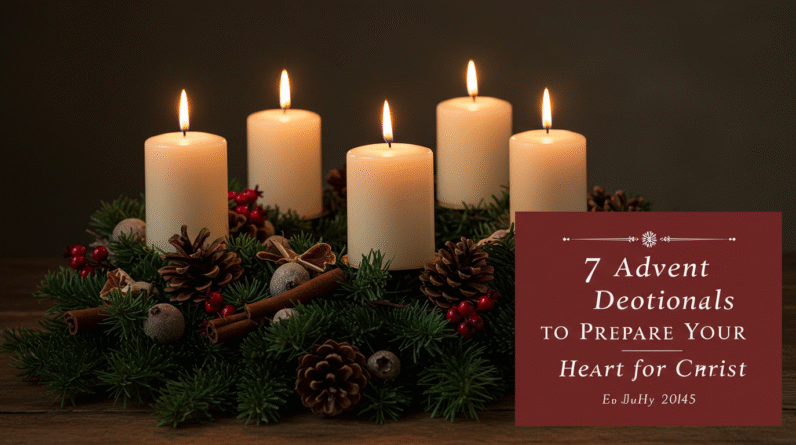The Power of Hope — A Deep First Week of Advent Reflection

Finding God’s light in seasons of waiting, longing, and quiet transformation
You are standing at the beginning of a season that feels both familiar and brand new. Advent always arrives gently. It doesn’t force its way into your calendar or demand loud attention — instead, it whispers. It calls you to pause, look up, and notice that beneath the busyness of December, God is doing something deep and holy.
But Advent also brings tension: joy mixed with tiredness, longing mixed with gratitude, hope mixed with the heaviness of the world. That is why the First Week of Advent centers on Hope — not the thin, sentimental kind the world offers, but the anchored, Spirit-filled, promise-shaped hope that Scripture reveals.
This extended devotional reflection will help you slow down, breathe deeper, and let Advent Hope shape your rhythms, your relationships, your prayers, and your perspective. You’ll explore biblical foundations, theological meaning, spiritual disciplines, emotional realities, and practical ways to carry hope into your daily life.
This isn’t just a seasonal article — it’s meant to guide you into an encounter with God.
📖 1. The Biblical Foundation of Advent Hope
“May the God of hope fill you with all joy and peace as you trust in him, so that you may overflow with hope by the power of the Holy Spirit.”
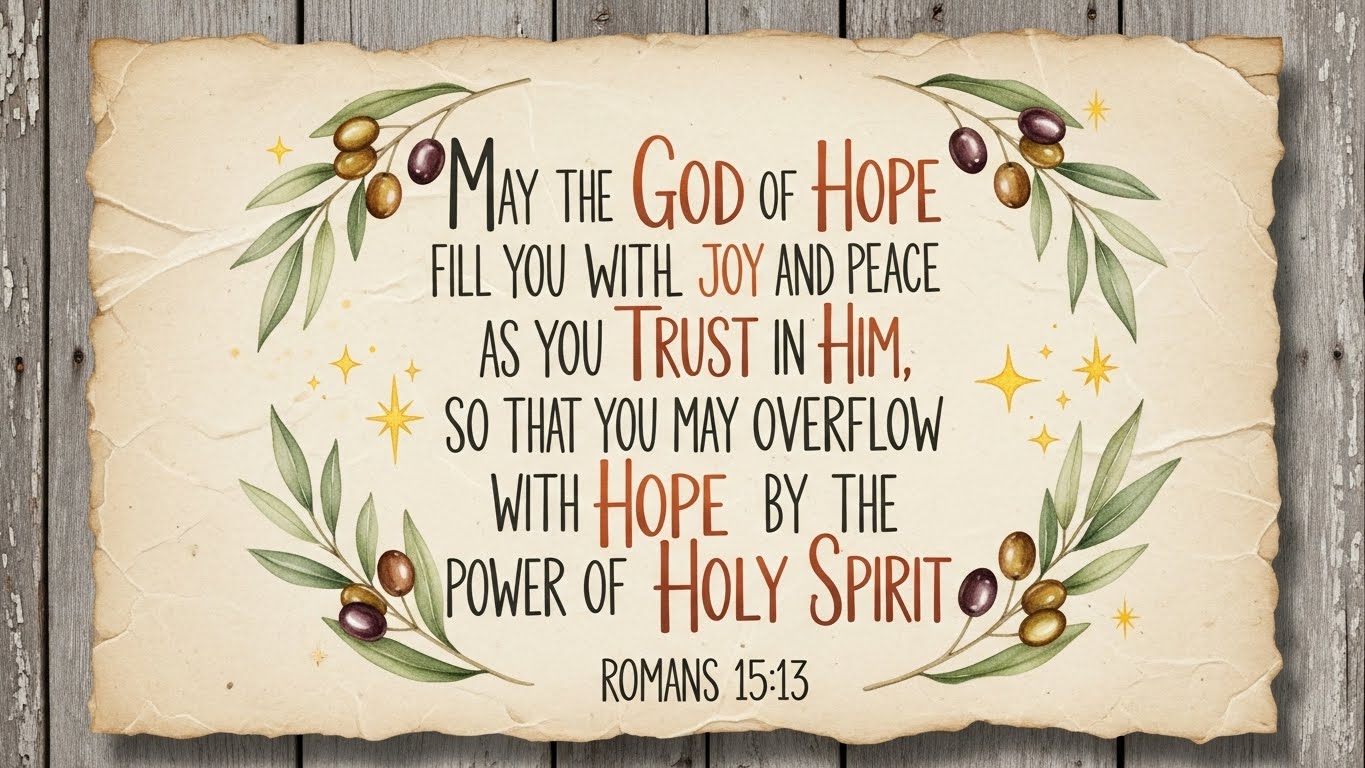
This single verse captures the entire spiritual dynamic of the First Week of Advent:
-
God is the source of hope
-
Trust unlocks joy and peace
-
The Holy Spirit empowers hope to overflow
Paul wrote Romans to a divided, pressured community in Rome — Jews and Gentiles trying to live out the gospel under cultural strain. Hope wasn’t a luxury; it was a necessity. And that’s true for you today, too. You need a hope that is sturdier than your circumstances and stronger than your emotions.
Advent Hope isn’t self-generated. It doesn’t depend on good news, stable schedules, or perfect outcomes.
It flows from the character of God Himself.
This is why Advent begins with hope: because hope steadies the soul for everything else God wants to form in you during the season.
🕯️ 2. What Advent Hope Really Means
Many people think hope means “I wish things would get better.” But Scripture reveals hope as something deeper:
Hope is confidence in God’s future based on His past faithfulness.
You look back at:
-
God’s promises
-
God’s covenant
-
God’s unchanging character
-
God’s fulfilled prophecies
-
God’s faithfulness in your own history
…and you look forward with trust.
The hope of Advent specifically centers on two realities:
-
Christ has already come — fulfilling ancient prophecies
-
Christ will come again — completing God’s redemptive plan
This is what theologians call “already, but not yet.”
It’s the tension of holding:
-
Joy and longing
-
Celebration and expectation
-
Peace and waiting
Advent Hope teaches you to live in that sacred in-between — fully aware of the brokenness of the world, yet deeply anchored in God’s unstoppable redemption.
👉 Need encouragement in difficult times? Check out “10 Bible Promises To Hold On To When You’re Facing Trials.”
🌊 3. Going Deeper — The Hidden Meaning of Waiting
Waiting is uncomfortable. It exposes impatience, fears, assumptions, and desires. But Scripture shows again and again that waiting is one of God’s favorite classrooms.
Abraham waited for a promise.
David waited to become king.
Hannah waited for a child.
Israel waited for a Messiah.
The early church waits for Christ’s return.
And you, too, are waiting — for healing, clarity, reconciliation, strength, breakthrough, direction, provision, peace, or comfort.
Advent transforms waiting from something passive into something sacred.
Waiting becomes worship.
Waiting becomes obedience.
Waiting becomes formation.
The hidden truth is this:
God does some of His deepest work in us while we wait.
👩🕊️ 4. Mary: A Portrait of Advent Hope
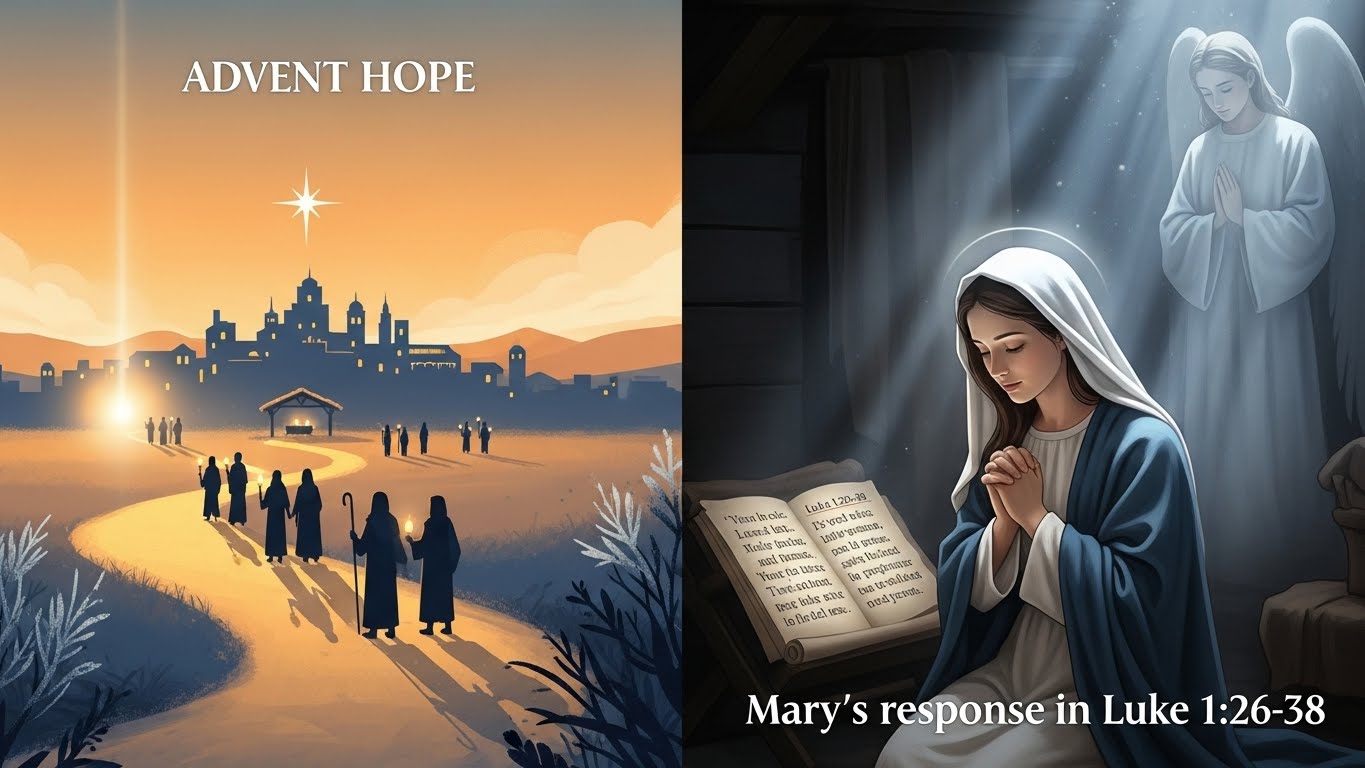
There is perhaps no better example of Advent Hope than Mary’s response in Luke 1:26-38.
She was young.
She had questions.
She had fears.
She didn’t know how God’s promise would unfold.
Yet she said the words that shape Advent:
“I am the Lord’s servant… may Your word to me be fulfilled.”
Mary teaches you that hope is not blind optimism — it is trusting God even when the path feels uncertain.
Your own “yes” may not be dramatic. It may look like:
-
forgiving someone
-
choosing kindness
-
Praying again when you feel discouraged
-
reaching out to a friend
-
serving quietly
-
obeying God’s prompting
-
surrendering your timeline
But like Mary, your simple obedience participates in God’s much bigger story.
👉 Reflect on God’s goodness through every season in “Romans 8:28 Reflection | Trusting God’s Plan Through Every Season.”
🧠 5. How Hope Reshapes Your Inner Life
The internal world is where Advent Hope first takes root.
Fear shrinks you.
Anxiety scatters you.
Worry drains you.
Uncertainty freezes you.
But hope expands your perspective.
Hope calms your thinking.
Hope shifts your choices.
Hope softens your heart.
Hope doesn’t deny the darkness — it declares that the light is stronger.
(John 1:5)
And when your inner world is anchored, your outer world transforms.
💡 6. Why Advent Hope Matters in a Modern World
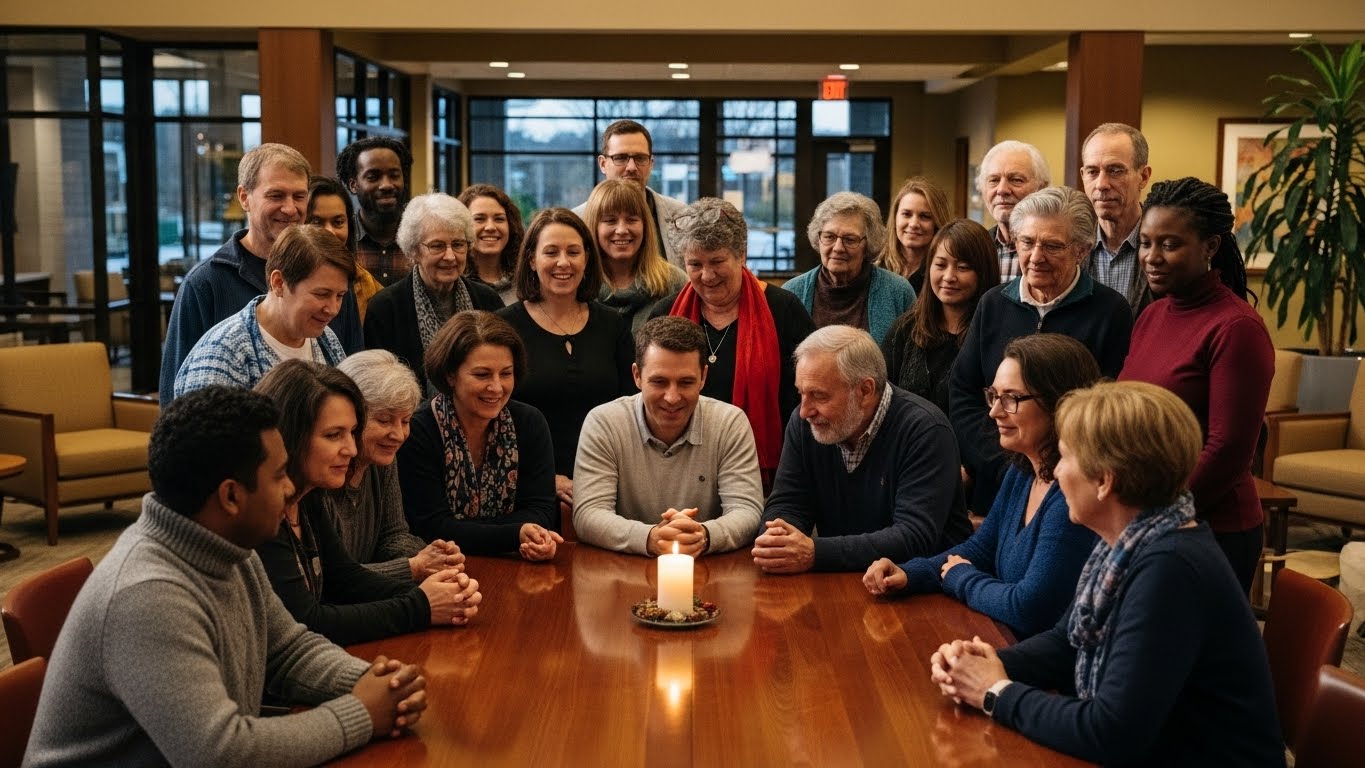
We live in a culture of pressure:
-
pressure to perform
-
pressure to produce
-
pressure to decorate perfectly
-
pressure to meet expectations
-
pressure to stay “strong.”
Advent gently confronts all of that.
It invites you to:
-
slow down
-
refocus
-
breathe
-
return to God
-
simplify
-
create moments of stillness
-
choose presence over perfection
Advent Hope is countercultural.
It says:
“You don’t need to fix everything. God is coming near — and He is enough.”
This shift changes how you approach:
Family
Fewer expectations, more grace.
Work
Less anxiety, more sense of calling.
Relationships
Less defensiveness, more compassion.
Spiritual life
Less performance, more intimacy with God.
The holidays
Less chaos, more sacred rhythm.
👉 If you’re seeking comfort in sorrow, see “God Comforts The Brokenhearted – Strength In Psalm 34:18.”
❤️ 7. Practical Ways to Live Out Advent Hope
You don’t need a complicated Advent plan.
Small practices become powerful when done consistently.
Daily Practices
-
Light your Advent candle each evening.
-
Read Romans 15:13 every morning.
-
Whisper a one-sentence prayer: “Lord, fill me with hope today.”
Acts of Kindness
-
Call someone who feels forgotten.
-
Bake for a neighbor.
-
Write a note of gratitude to someone in your church.
-
Give anonymously to someone in need.
Spiritual Disciplines
-
Fast from social media for an afternoon.
-
Replace music with silence during your commute.
-
Begin a “Hope Walk” — 10 minutes of prayerful reflection outside.
Hope Journal Prompts
-
Where did I see God’s fingerprint today?
-
What promise of God feels most alive to me this week?
-
Where am I struggling to trust — and why?
These small decisions cultivate expectancy — the posture that says:
“I believe God is moving, even if I don’t see it yet.”
👉 8. Faith Reflection Box
Pause. Breathe deeply.
Ask yourself:
Where in my life do I most need God’s hope right now?
-
In a relationship?
-
In your finances?
-
In your health?
-
In your spiritual life?
-
In your dreams?
Let Advent begin exactly where your heart feels tender, tired, or stretched.
Hope grows best in soil that feels fragile.
❓9. Q&A — Honest Questions for a Hope-Filled Advent
Q1: Does Advent Hope mean I shouldn’t feel sadness or doubt?
Not at all.
Advent allows you to hold hope and sorrow in the same hands. God meets you inside your emotions — not apart from them. Psalm 42:11 shows that hope often coexists with discouragement.
Hope doesn’t erase pain; it reframes it.
👉 Related: Explore more Advent reflections in “7 Advent Devotionals To Prepare Your Heart For Christ.”
Q2: How can I help my family experience Advent Hope when life is busy?
Choose rhythms, not rules.
Short traditions done consistently create meaning:
-
a candle-lighting
-
a 2-minute reading
-
a moment of gratitude
-
a simple prayer
Small steps, done together, build spiritual memory.
Q3: What does “overflow with hope by the power of the Holy Spirit” look like practically?
It looks like:
-
Patience when someone frustrates you
-
Gentleness when others are harsh
-
Encouragement instead of criticism
-
Generosity instead of self-protection
-
Peace that others can sense
Overflow is not a feeling — it’s a lifestyle shaped by the Spirit’s fruit (Galatians 5:22–23).
👉 See also: For a deeper look at hope beyond the Advent season, read “Hope Ahead: Trusting God’s Promises For Your Future.”
🌟 10. Hope in Seasons of Pain, Loss, and Disappointment
Advent does not pretend that everything is merry. Many people enter December carrying:
-
grief
-
loneliness
-
financial worries
-
health burdens
-
relational strain
-
spiritual dryness
Advent Hope speaks tenderly to these places.
God is not distant from your pain. He entered it.
He came as Emmanuel — God with us.
Because Jesus stepped into human suffering, you can bring your own suffering to Him without fear.
Hope doesn’t demand that you “cheer up.”
It invites you to lay everything before the One who understands and redeems.
🏡 11. Bringing Advent Hope Into Your Home
The home is the first sanctuary God gives you. Advent Hope can transform its atmosphere:
-
Replace background TV noise with worship or quiet.
-
Add one nightly family ritual.
-
Place a Scripture card by your doorway.
-
Practice a moment of silence before meals.
-
Encourage each person to share one “hope” for the world.
These small touches weave hope into the rhythm of everyone living under your roof.
👉 Anchor your Advent prayers with “The Lord Listens (Psalm 116).”
🤝 12. Hope in Community
Hope grows faster when shared.
The early church was built on:
-
shared meals
-
shared prayer
-
shared burdens
-
shared stories
Sharing hope aloud strengthens faith. Tell someone what you’re praying for. Ask others how God is working in their lives. Pray together. Encourage someone who is struggling.
Hope multiplies when spoken.
🕯️ 13. A Simple Advent Routine (You Can Start Today)
A gentle, sustainable rhythm for the First Week:
Morning:
Read Romans 15:13 + short prayer
Midday:
Practice a micro-act of kindness
Evening:
Light your Advent candle + Scripture reading + moment of quiet
Night:
Write one line in your Hope Journal
This simple routine keeps hope alive in your heart all week.
🙏 14. A Closing Reflection for the First Week
As you move through this rich first week of Advent, ask yourself:
-
What is God teaching me through waiting?
-
How is He softening my heart?
-
What fears is He gently confronting?
-
What promises is He reminding me of?
-
How is hope slowly reshaping my perspective?
Advent isn’t about perfection. It’s about presence.
It’s not about achieving spiritual milestones. It’s about making room for God.
✨ 15. Final Prayer — Carry It Into the Week
God of Hope,
Fill my mind with Your peace,
my heart with Your joy,
and my life with Your presence.
Teach me to wait well.
Train my soul to trust You.
Help me notice your movement in the middle of my ordinary days.
Let hope overflow from my words, actions, and relationships.
Make my life a light that points others to You.
In Jesus’ name, Amen.
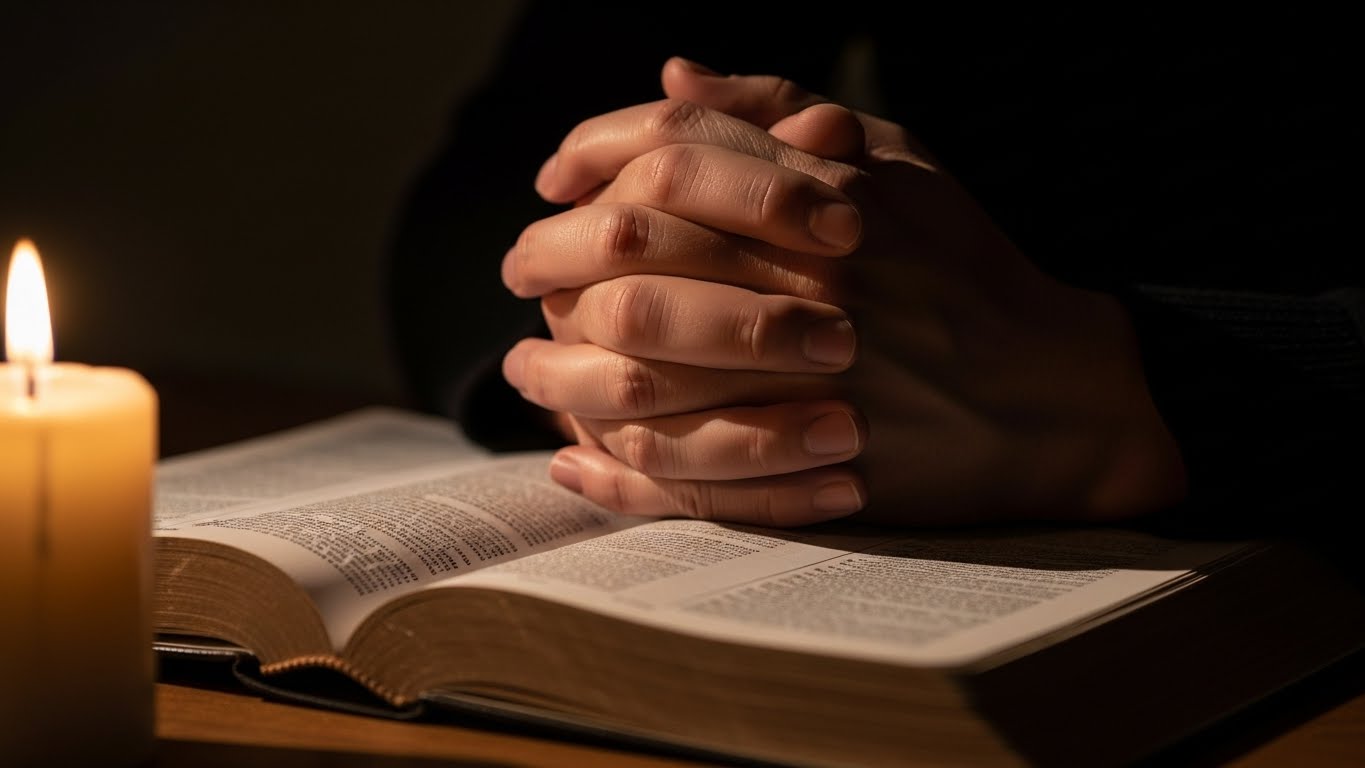
More Inspiration Awaits — Read These Next










A powerful retelling of John 8:1-11. This book brings to life the depth of forgiveness, mercy, and God’s unwavering love.

Don’t let your calling stay hidden. Start a Christian blog or website using Hostinger — with 99.9% uptime, a free domain, and SSL, your voice can shine for God’s glory anytime, anywhere.


Renew your energy and restore balance naturally. Mitolyn helps support a healthy metabolism, giving you the vitality to live out God’s calling with strength and confidence.




















